Networks are the fundamentals behind businesses worldwide. It plays a pivotal role in serving your employees for administrative purposes and your clients across the continents. The networks help you keep information in a centralized location - accessible to those who need and restrict every other inbound request. So how do you provide continuous top-notch end user experience and maintain your rapidly evolving network? Only by monitoring the availability, health, and performance of your networks over time with the help of reliable, real-time network monitoring tools.
While selecting a network monitor tool for your IT environment, it is important to weigh in your current requirements and also your future needs because choosing the right one among various tools for network monitoring is crucial. Some of the essential elements that a network monitoring tool requires are:
Learning that your network is down from your end users is the nightmare that every IT admin tries to avoid. The network monitoring application and its reporting tools must provide performance insights into your network in real time. This helps you identify performance hiccups early and avoid potential outages.
Employing individual network monitoring tools for monitoring various network components such as switches/routers, servers, virtual environment, HCI, applications, storage devices, etc., and also employing network monitoring tools for Windows and Linux environments separately is more trouble than help as the tools themselves require constant management, additional resources, and there is also a certain learning curve associated with each network monitoring tool. Therefore, the network performance monitoring tools should support extensive monitoring in a single console.
Network scalability is an important aspect to be considered when selecting enterprise network monitoring tools. A network management tool or network monitoring software can be called as scalable when it is more adaptable to the changing needs or demands of the business or users. Scalability helps a network to stay in par with increased productivity, trends, changing needs and new adaptations. Scalabiity ensures that the overall network performance does not significantly degrade, even if the size of the network is increasing. Businesses also need remote network monitoring tools for managing multiple geographical locations from one console.
In network monitoring, automation helps network performance monitoring tools to react based on threshold values or a set of framed rules/ criteria being met. With automation, the monitoring network tools can automatically detect and troubleshoot problems (proactive monitoring), send alert notifications, forecast storage growth, and much more. When you are monitoring and managing multiple devices in your environment, automation comes in super handy and saves you ample time and resources, making it an important usability aspect of your network monitoring solutions.
User Management helps organizations ensure network security by providing access to the designated users only. Apart from providing access to users with roles, the network monitoring tool should also define the scope for users. This helps IT teams with multiple staffs as it clearly defines their operational boundaries. Network monitoring tools with the above features are excepetionally benefiting to your business.
OpManager is a powerful network management and monitoring tool that monitors switches, routers, servers, WLC, load balancers, VPN, printers, firewalls, VMs, Nutanix environments, and anything that has an IP and connected to the network - in a single console.
Network switches and routers form the backbone of any IT infrastructure. Any issue with switch breaks the end user connectivity with the network. Using OpManager, you can monitor switches, and routers from the likes of Cisco, Juniper, Aruba, ZTE, and many other vendors for availability, health, and performance in real-time for 2,000+ parameters and avoid possible network pitfalls. Apart from monitoring switches, OpManager maps switch ports to devices and monitors the availability of the switch ports.
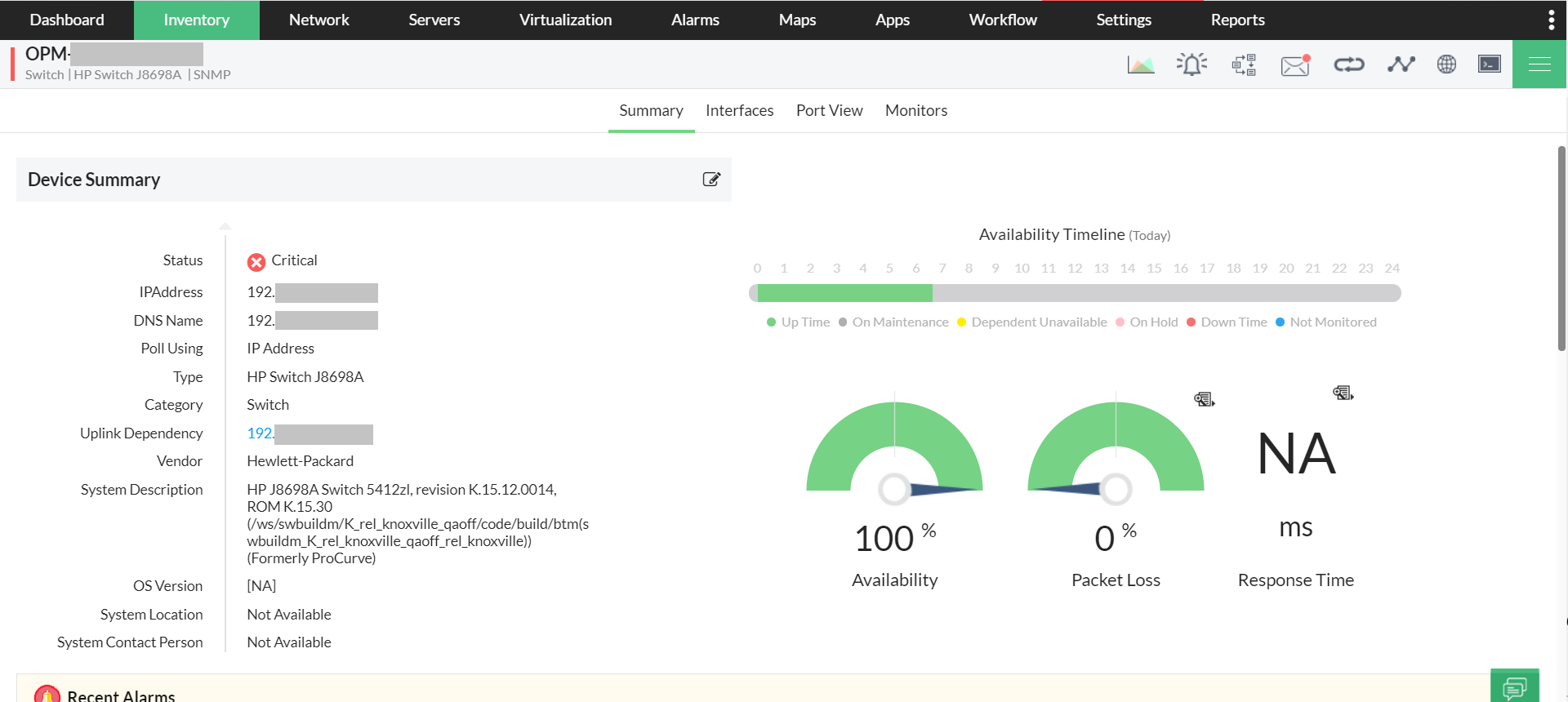
Network interfaces are one of key performance indicators (KPI) as they help identify network performance degradation at the earliest. OpManager, the best network monitoring tool, monitors interfaces using SNMP and provides a single customizable dashboard to view and analyze bandwidth performance and network traffic for your IT network. You can monitor interfaces by checking the availability status of interfaces and monitor traffic speed on the interface, errors, discards, etc. using OpManager.
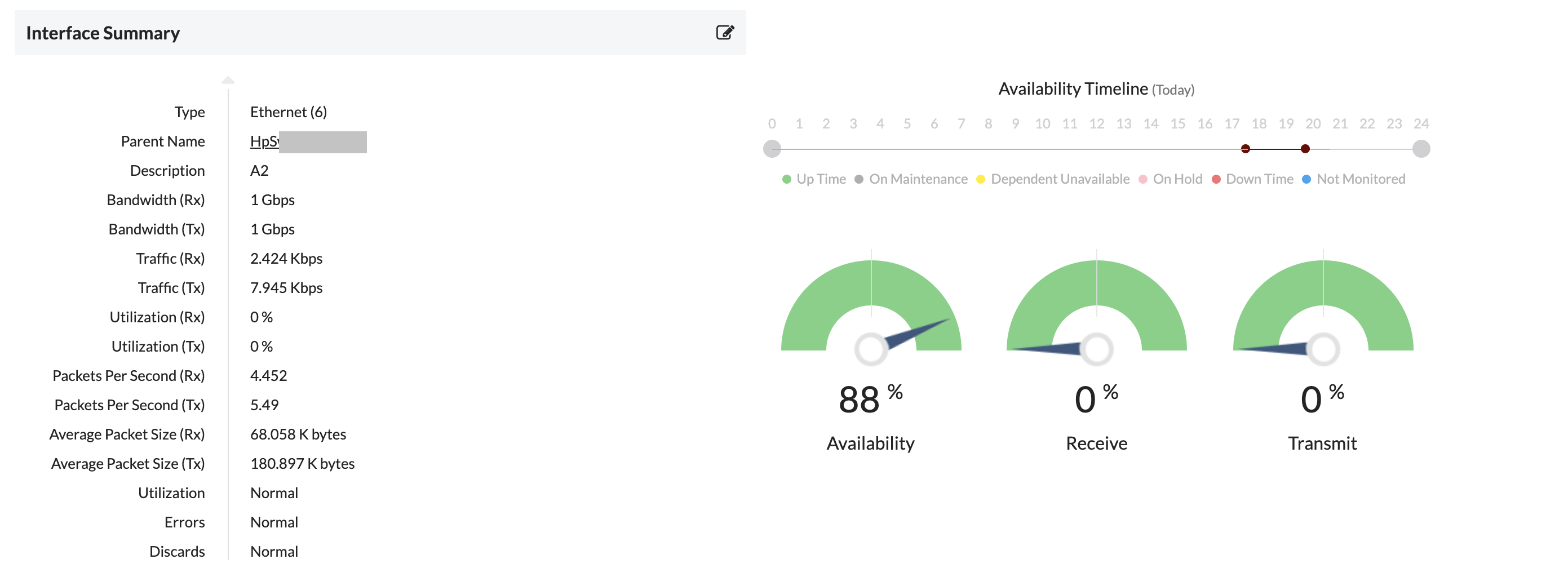
OpManager's multi-vendor WLC monitoring module allows you to keep your network intact by providing in-depth visibility of your wireless LAN controller (WLC), its associated service set identifiers (SSIDs) and access points (APs). Cisco's WLC monitoring tool in OpManager allows direct discovery of Cisco WLC and their associated SSIDs, APs and helps you monitor the overall performance of your wireless network with the help of Cisco WLC monitor. The WLC snapshot page provides inventory information, the device availability status, and other similar information. In addition, knowing the top five access points based on usage tells you who the top talkers are in your WLC environment, and custom dials display information on various parameters, including CPU and memory usage.
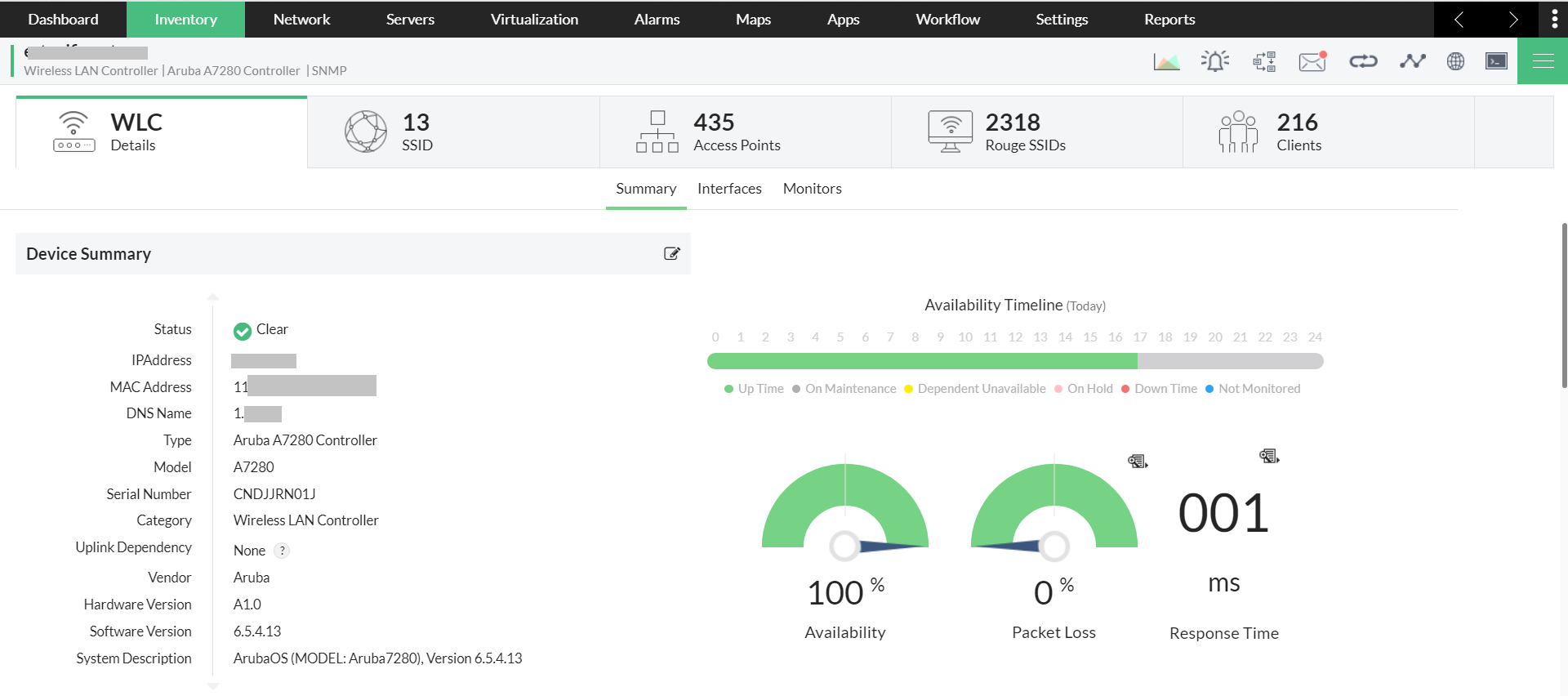
Organizations allow connections into their networks through VPNs for their remote workforce. These connections can sometimes be compromised, resulting in data theft or network attacks. With a monitoring tool like OpManager, you can monitor your VPN by tracking the number of active VPN sessions, VPN tunnel status, and VPN tunnels count in real time, and also receive instant alerts on VPN connection regularities making your network secure and keeping your remote productivity issues at bay.
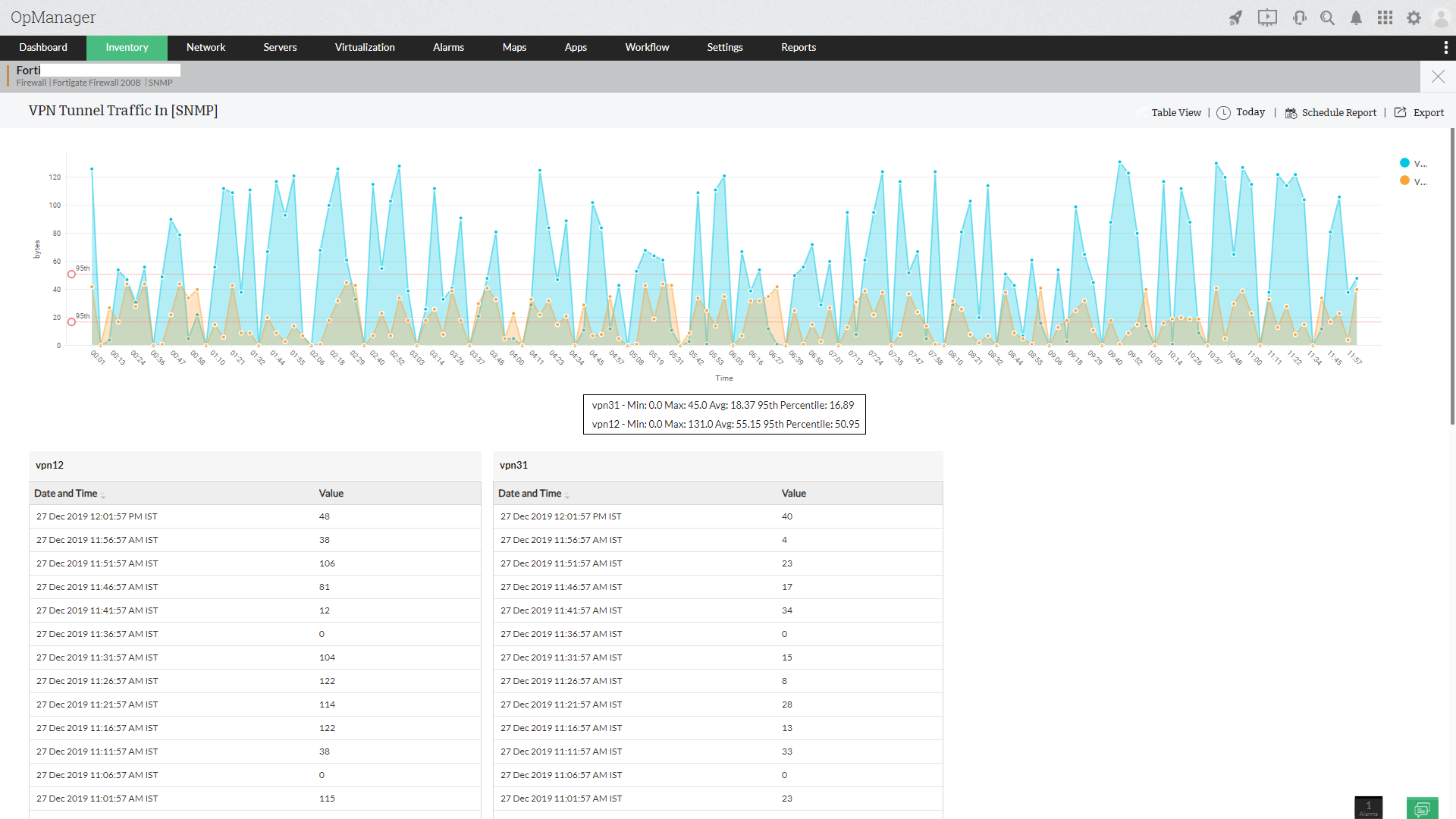
Every organization's network has unique needs, so top-of-the-line networking technologies are employed to address them. This helps networks deliver business services but also poses a challenge with monitoring and managing the network. Using multiple network management tools is not efficient and cost effective. With OpManager, apart from monitoring switches, servers, etc., you can monitor VMware, Hyper-V, Hypervisors, Cisco UCS, Nutanix infrastructures, and more, all within a unified console, making it the best network monitor. Additionally, you can monitor your WAN with Cisco IP SLA using OpManager.
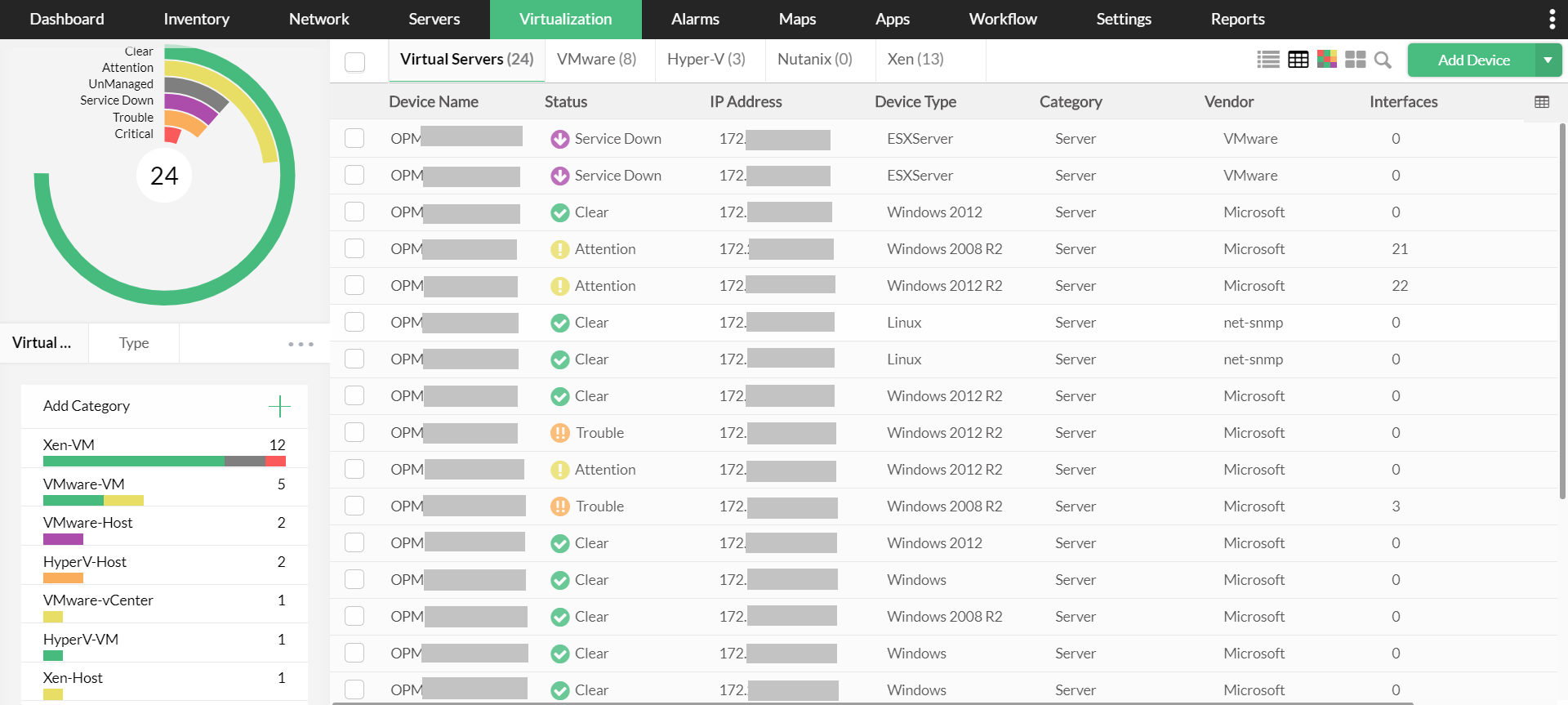
Learn how choosing the right network monitoring tools can impact your business.
Register for a personalized demo now!
Access your OpManager's network monitoring and reporting anytime and anywhere using the new ManageEngine OpManager mobile application. Available for both Android and iOS, this lets you visualize your infrastructure, act on the alerts, drill-down to the root cause of the problem without having to be physically present in your server room to resolve a fault!
Apart from the above, OpManager, your comprehensive network monitoring solution monitors Windows servers, Linux servers, storage devices, Windows services, processes and scales upto 30,000 devices out of the box. This network software makes network monitoring effortless with intelligent automations, ML-based forecasting, and extensive protocol support. Here are some of OpManager's network monitoring applications:
More than 1,000,000 IT admins trust ManageEngine ITOM solutions to monitor their IT infrastructure securely